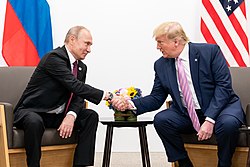| Trump–Russia relations |
|---|
 |
This is a chronology of significant events in 2016 and 2017 related to links between Trump associates and Russian officials during the Trump presidential transition and the Russian interference in the 2016 United States elections. Following the timeline of Russian interference in the 2016 United States elections before and after July 2016, this article begins on November 8 (election day) and ends with Donald Trump and Mike Pence being sworn into office on January 20, 2017. The investigations continued in the first and second halves of 2017, the first and second halves of 2018, the first and second halves of 2019, 2020, and 2021.





